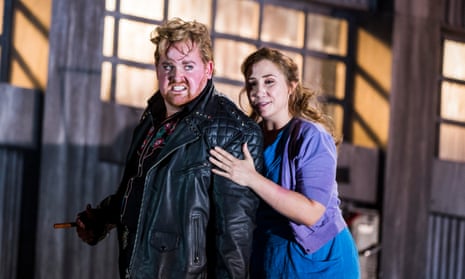Mark Wigglesworth is bringing his brief tenure as English National Opera’s music director to a close with a revival of David Alden’s 2006 production of Janáček’s Jenůfa, and what he offers is a deeply humane performance that serves as a reminder of what a loss to the company his departure may be. This is Janáček done slowly and lyrically, with the emphasis placed on the score’s dark poetry and depth of musical and psychological detail. The opera’s passion and compassion burn fiercely yet lingeringly: this is an interpretation that seeps under your skin rather than hits you in the solar plexus and is unquestionably all the more powerful for it.
The cast is superb. Nicky Spence’s tenor gleams thrillingly and sexily as caddish, weak-willed Števa. Peter Hoare is the intense Laca, his voice dark and strong, the man’s bitterness, desire and remorse beautifully realised. At the evening’s centre, however, lie the great scenes between Laura Wilde’s Jenůfa and Michaela Martens’s Kostelnička.
Wilde, making her European debut, is quite a find, a warm-voiced soprano with real lustre in her tone, and a deeply affecting, if finely understated, actress: Jenůfa’s numbed grief for her dead baby tears you in two, as it should. Martens’s metallic tone and fiercely etched phrasing admirably suggest both Kostelnička’s rigid inflexibility of will and the private anguish that undermines it.
Alden relocates the opera to a faceless eastern bloc industrial town in the 1980s, where the Buryja mill has become a factory and Jenůfa and her stepmother live in a dilapidated tenement. The transposition occasionally muddies the back history, which is dependent on the complexities of ownership, inheritance and property, and it consequently become unclear how Števa has acquired the cash he repeatedly flashes.
But the sexual, emotional and religious resonances are wonderfully explored and delineated throughout. The ending, in which Jenůfa and Laca finally move towards their first embrace, is a moment of real and genuine hope in a tragically jaded world.
- At the Coliseum, London, until 8 July. Buy tickets from theguardianboxoffice.com, 0330-333 6906.

Comments (…)
Sign in or create your Guardian account to join the discussion